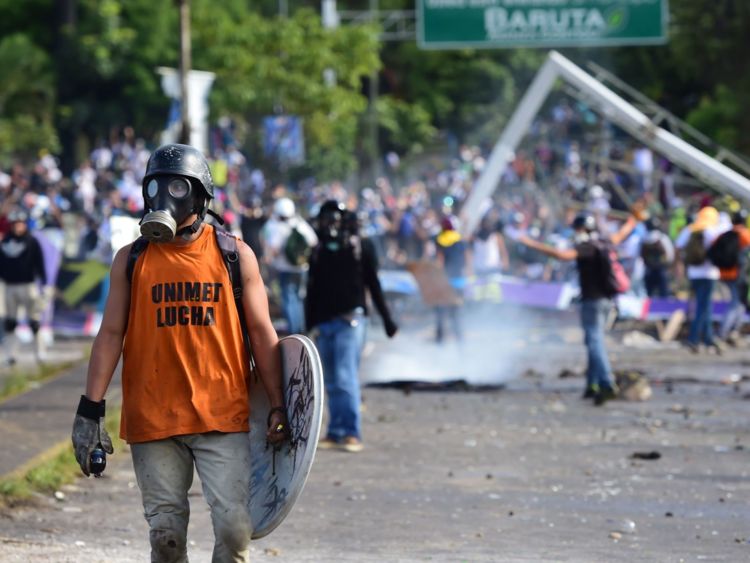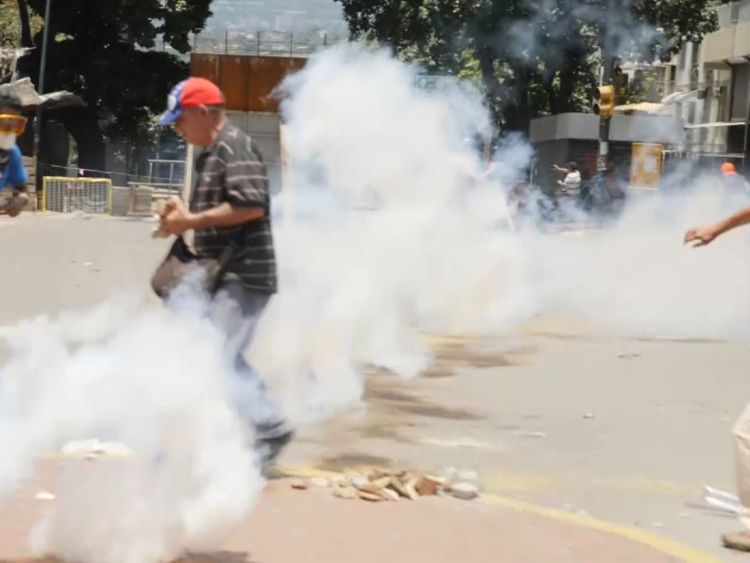Sky’s Stuart Ramsay is caught up in a tear gas attack and shot at by police while covering Venezuela’s election.

The election result was never in doubt.
How the opposition politicians, the street fighters and Venezuela’s security services react will determine whether or not the death toll rockets in the coming days.
The omens are not good.
Weeks of confrontation, flats raided and set on fire by the police, shootings of unarmed civilians, Molotov cocktails and roadside bombs, injured police, armed pro-government militias roaming the streets at night and now the military deployed. It’s the stuff of nightmares.
Venezuela’s economy is dominated by the oil industry, and it has the largest proven reserves of crude oil in the world. President Hugo Chavez, who was elected in 1998 on a populist platform, consolidated state control over the economy and nationalized its telephone and electricity companies. Chavez was succeeded upon his death by his vice president, Nicolas Maduro, who was elected president in 2013
President Maduro‘s government has faced ongoing protests and civil unrest since the beginning of 2014. There are growing signs that Maduro‘s support in the region is dwindling, as neighboring countries have expressed concern about his government‘s response to the crisis, including the aggressive treatment of protesters.
The anti-government protesters had been calling the election day “D-Day” for a week and they are promising it is just the start.
Every announcement from the government on moves to change the constitution or the law will be met with yet further street protests.
Despite international condemnation and internal unrest, the government is ploughing on with its agenda of taking total control; and it is difficult to see what the opposition or its opposition-controlled parliament can do about it.

The new assembly, however illegitimate, is a higher body and the courts loaded with Maduro judges will support it.
With the more militant elements of the opposition already frustrated by what they see as inertia from their political leaders it seems likely that things really are going to get much worse.
The security forces tactic is to stop mass marches before they even start.
Where groups of demonstrators gather – even in small numbers – they are hit.
The first volleys of tear gas are fired across their barricades, as they gather. Soon afterwards, the National Guard and National Police on motorcycles, in full riot gear and carrying shotguns, make their charge.
We were part of the chaos as it developed. Young demonstrators scooped up the tear gas and threw it back. But as the motorcycles got nearer there was utter pandemonium as people tried to flee, scrabbling over their own barricades that were now locking them inside the kill zone.
Hundreds streamed through narrow streets and we were virtually carried along as the gas enveloped the crowds.
It is choking and debilitating. Your eyes and throat burn.
They were heading for a cathedral and they pushed inside as more tear gas rounds sizzled around us.
We paused for a moment before realising we were being hunted down and ran as fast as we could away from the trouble.
Near the brow of a hill we stopped and looked back. The guards were through the barricades and heading towards us.
There was no escape and we stood with our hands in the air, with our press credentials on show.
Dozens of motorcycles passed us on the corner. They could see we were unarmed and they could see three of us were European and, let’s be frank, not very young. But one of the riders fired at point blank range. Our Venezuelan producer was hit in the arm with salt pellets.




Deadly violence erupted around the controversial vote, with a candidate to the all-powerful body being elected shot dead and troops firing weapons to clear protesters in Caracas and elsewhere. / AFP PHOTO / Ronaldo SCHEMIDT (Photo credit should read RONALDO SCHEMIDT/AFP/Getty Images)
There is no excuse for this as a rule, but this is a very violent confrontation and it is beginning to resemble a war. In these circumstances things like this happen.
The same motorcycle unit sped off to another confrontation 100m from our position. As they passed through one of the rubbish strewn barricades an enormous roadside bomb was detonated. This is where it is going. I had not expected this type of escalation. The army is now deployed as well.
The numbers of people being killed continues to rise. It seems neither side is prepared to back down. It looks certain that things are going to get even worse.













